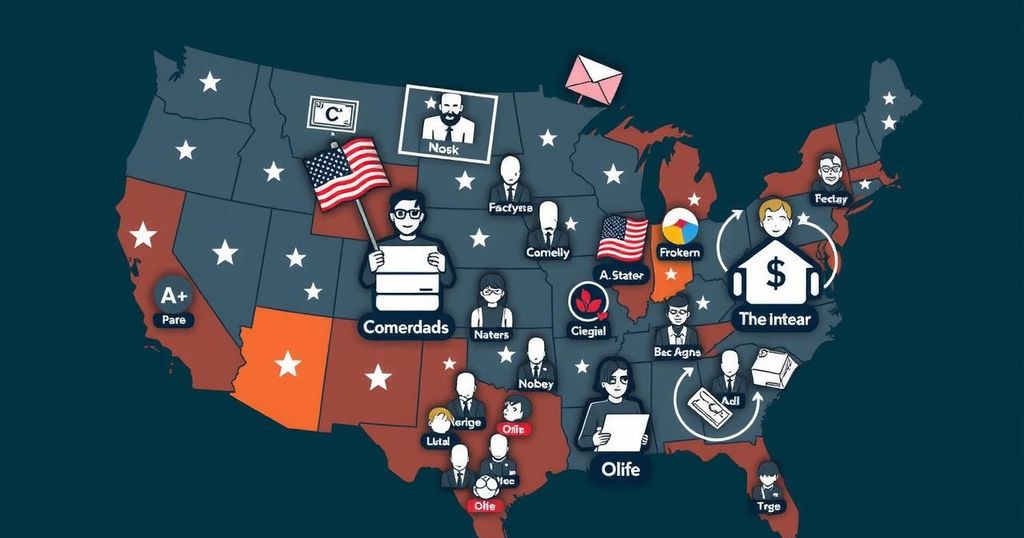Profiteers Exploit Conspiracy Theories in the US Election Cycle

Numerous online businesses are exploiting conspiracy theories and hate to sell political merchandise during the US election cycle. Organizations such as United Patriot utilize misinformation to attract Trump supporters and promote xenophobic narratives, with operations identified as being facilitated from outside the US. Moreover, a global network of scammers engages in fraudulent activities, leveraging provocative content to boost visibility and profits, creating a widespread issue that complicates the intersection of commerce and disinformation.
The ongoing United States election cycle has witnessed a disturbing trend where online businesses, such as United Patriot, exploit conspiracy theories and hate-driven narratives to sell merchandise. One example includes T-shirts featuring AI-generated cats and references to racist conspiracy theories circulated by former President Donald Trump about Haitian migrants. These items, while appearing innocuous, contribute to widespread xenophobic and harmful behavior against targeted communities. According to a report by the Bureau of Investigative Journalism (TBIJ), numerous online operators engage in the dissemination of misinformation alongside selling political merchandise, targeting Trump supporters specifically. Collectively, they have invested heavily in political advertising on platforms like Facebook, accumulating millions of impressions. These operations, often based outside the United States, capitalize on social media algorithms designed to promote engaging content—a mechanism that inadvertently elevates inflammatory and false narratives. Hannah Perry, of the think tank Demos, highlights that such engagement-driven algorithms privilege emotionally charged content, leading to an upswing in divisive narratives as they coincide with the electoral discourse. Additionally, other networks, particularly originating from Nigeria, exploit political conspiracy theories to promote sports betting scams. They have developed large followings by integrating sensational political content, which serves as a lure to attract users to their fraudulent schemes. Despite the exposure and investigation into these scams, many operate openly on Facebook, illustrating the challenge authorities face in combating online misinformation and exploitation. As the election intensifies, the frequency of posts containing misinformation from these scams has surged, tapping into current events and conspiracy theories to appeal to potential victims. Online merchants have similarly aligned their advertising strategies with contentious political messaging, underscoring a larger, more complex issue of profit-driven disinformation that transcends national borders Companies such as Meta, which owns Facebook, have been criticized for their role in enabling such harmful content through their algorithms, which statistically favor divisive narratives. Individuals such as Frances Haugen have publicly denounced the platform’s failure to address the proliferation of hate and misinformation effectively. Joe Ondrak, of Logically, points out that the existing narratives are easily exploited due to the reward systems present within these social media algorithms, fostering an environment ripe for scammers and purveyors of falsity to thrive.
The rise of misinformation, particularly in the context of US elections, has prompted a sharp focus on how digital marketing strategies can exploit social media to promote harmful narratives. Online businesses are increasingly leveraging conspiracy theories and xenophobic sentiments to market merchandise, with a particular focus on appealing to politically motivated audiences. This exploitation of emotion-driven content is not just limited to domestic operations but extends globally, with networks of scammers facilitating various forms of deceitful engagement alongside politically charged messaging, leading to a complex intersection of commerce, disinformation, and social dialogue. The algorithms governing social media platforms amplify such content, resulting in a self-perpetuating cycle of engagement that bolsters the visibility of extremist and false narratives, thereby creating opportunities for financial exploitation.
In conclusion, the exploitation of the United States electoral landscape by online merchants reflects a broader trend of capitalizing on misinformation and hate for profit. As these businesses employ provocative narratives to enhance visibility and attract customers, they create a detrimental feedback loop that further entrenches divisive sentiments in the public sphere. The challenge posed by such operations underscores the urgent need for greater accountability among social media platforms and vigilance from regulatory entities in the fight against the pervasive influence of misleading information and the resultant societal harm.
Original Source: www.wired.com







